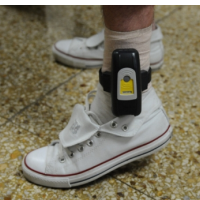Parolees, Taking Advantage of Overcrowded Jails, Are Ditching GPS Tracking

Whether the consequences were unintended, unexpected or merely underappreciated, the results are the same.
A lot of parolees, most of them sex offenders, are disabling the GPS tracking bracelets they are forced to wear by the courts with little fear of retribution. They know that a state realignment program, initiated by Governor Jerry Brown in late 2011 to shift responsibility for certain inmates from overcrowded prisons to county jails, is making it difficult for local authorities to control parolees with GPS.
“Realignment created a crack a lot of people fall through,” Tom Tobin, vice president of the California Sex Offender Management Board, told the California Health Report.
There were 7,500 parolees being tracked via GPS as of December 11, 2012, according to the California Department of Corrections and Rehabilitation (CDCR). Although sex offenders were not meant to be cut loose or overlooked during the transition, the results have been obviously bad, but difficult to precisely measure.
Since realignment began, more than 3,400 arrest warrants for GPS tampering have been issued, a 28% increase over the year before, according to information gleaned by the Los Angeles Times from multiple sources. Most of the violators are sex offenders and many have multiple convictions. But the Times reported Monday that the state is wavering on its data and, while that number may actually be higher, “Arrest warrants posted by the state show more than 433 sex offenders at large, wanted for interfering with their monitors.”
CDCR data reported on the website of state Senator Ted Lieu, who co-authored legislation earlier in the month to increase penalties for monkeying around with a GPS bracelet, seemed less shocking, but bad news nonetheless. A total of 173 parolees cut off their bracelets between October 2010 and September 30, 2011, but 300 cut them off during a comparable period in 2012, according to the CDCR.
“Those parolees are unaccounted for and authorities have no way to track them down,” Lieu said.
The state realignment in 2011 was in reaction to state and federal judicial directives to improve the health care of inmates and reduce overcrowding in California prisons. Both had reached critical levels of unacceptability. The response was to shift responsibility for many less serious, non-felonious criminals to local jails that were, themselves, often overcrowded.
Realignment not only moved responsibilities from prisons to jails. It shortened the time, directly and indirectly, that prisoners remain behind bars. Before realignment, a sex offender who broke parole went back behind bars and risked being sent back to prison for up to a year. Now, the penalty is 180 days in jail, which few serve. Actions by local jurisdictions vary widely.
–Ken Broder
To Learn More:
Paroled Sex Offenders Disarming Tracking Devices (by Paige St. John, Los Angeles Times)
More Parolees Tamper with Ankle Monitoring Bracelets (by Heather Tirado Gilligan, California Health Report)
New Data Supports Sen. Ted W. Lieu’s Legislation to Crackdown on Parolees Who Remove GPS-Ankle Bracelets (State Senate Ted Lieu)
Sen. Ted W. Lieu Introduces Plan Making It a Felony for Parolees to Cut off GPS-Aided Ankle Bracelets (State Senate Ted Lieu)
Prison Reform’s Unintended Consequences (by Heather Tirado Gilligan, California Health Report)
GPS Data (California Department of Corrections and Rehabilitation) (pdf)
- Top Stories
- Controversies
- Where is the Money Going?
- California and the Nation
- Appointments and Resignations
- Unusual News
- Latest News
- California Forbids U.S. Immigration Agents from Pretending to be Police
- California Lawmakers Urged to Strip “Self-Dealing” Tax Board of Its Duties
- Big Oil’s Grip on California
- Santa Cruz Police See Homeland Security Betrayal in Use of Gang Roundup as Cover for Immigration Raid
- Oil Companies Face Deadline to Stop Polluting California Groundwater





